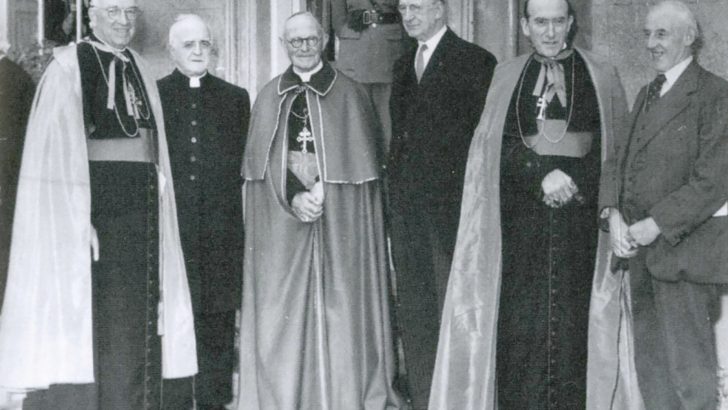It’s a trend these days for people to loathe their past – especially the past history and culture of their country. There are lots of serious faults with our past in Ireland, but when the past becomes the all-consuming bogeyman, present abuses slip under the radar. Present and ongoing abuses are the ones we can do something about, and they often get ignored, waiting for a future generation to get outraged when it’s too late for many.
The latest instalment of our national self-flagellation, ironically enough, was the documentary Leathered: Violence in Irish Schools (RTE One, Wednesday). It seems to have been prompted by accounts of corporal punishment that featured strongly on RTE Radio’s Liveline a few months ago, which in turn was prompted by stories of sexual abuse in a Documentary on One programme, Blackrock Boys. It made for uneasy watching and the stories of extreme corporal punishment were believable and upsetting. I remembered examples from my own school days, though not as extreme as some of these accounts.
I thought the programme made the mistake of conflating slapping with beatings and uncontrolled violence that smacked of sadism and psychosis. Unfortunately, slapping was tolerated and even approved by the culture, seen as an effective means of discipline, but the extremes never were and so there were several examples of brave parents and doctors confronting teachers and schools. The culture defence is poor – religious-run schools should have set a far higher standard, guided by beatitudes rather than bad attitudes.
Unlike the sexual abuse, the physical punishment was public, so in a way the stories were not at all surprising. Apart from the grim personal testimonies, the parts I found most interesting were the stories of those campaigning against corporal punishment in the 1960s and even earlier. Eventually they brought about change, though it was slow in coming. I was also taken with the testimony of one teacher who used corporal punishment initially but gave it up as he found it ‘de-humanising’ for the students and himself. The wads of text at the end were informative and concerning – including a lay teacher denying the many accusations against him.
What took from the programme was the sense of an axe being ground, of a not-so-hidden agenda to demonise the Church – the obligatory shots of Archbishop John Charles McQuaid, with creepy music accompanying images of shadowy religious swinging leathers and rosary beads. I thought the central story was ill served by the melodramatic reconstructions. This was only part of the story of the Church in Irish education – once again the teachers who were inspiring and kind were sidelined – it suits the agenda.
On Talkback (BBC Radio Ulster, Thursday) former The Irish Catholic editor Michael Kelly made this very point about the full story not being told. This time it was in relation to yet another film about the Magdalen Laundries – Small Things Like These, based on the novel by Claire Keegan. He wasn’t trying to whitewash any abuses but just pointing out that there was another side to the nuns’ story – e.g. the wonderful humanitarian work some of them did abroad, even when they were of advanced years. Also in the conversation with presenter William Crawley was Patsy McGarry of the Irish Times who, at one stage was accusing Michael Kelly of ‘distraction’. The latter called on him to quit the ad hominem attack. Mr McGarry backed off, and later said that most priests were ‘very fine men’ and that his problem was for Church authorities involved in cover up. Helen O’Hara of Empire magazine pointed out that not all modern film representations of clergy served to demonise – she instanced the priests in Lady Bird and Calvary – but we were a long way from the Bells of St Mary’s!
With all this negativity you’d long for green shoots. On The Pat Kenny Show (Newstalk, Thursday) Breda O’Brien, columnist with The Irish Catholic and the Irish Times, discussed with Fr Iggy O’Donovan and presenter Anton Savage, a religious revival among young men, especially in the USA. While there was a danger that it was too closely allied to right wing political views, she regarded it as an interesting phenomenon and also noticed an enthusiasm for faith among some youth movements in Ireland – e.g. Youth 2000. She welcomed this as a positive thing and expanded on these thoughts in her Irish Times column last weekend – well worth a read.
Pick of the week
FILM: QUIZ SHOW
TG4: Saturday November 9, 9:35pm
(1994) Starring Ralph Fiennes, John Turturro, Paul Schofield. A potentially fixed game show is investigated. Intelligent film, with moral dilemmas. Directed by Robert Redford.
FILM: FATHER STU
Channel 4 Saturday November 9, 10pm
(2022) Writer and director Rosalind Ross’s biographical drama about a hapless boxer-turned-priest whose gloves are off in the fight for the Lord.
THE MEANING OF LIFE
RTE One Sunday November 10, 10:30pm
Author and journalist Fintan O’Toole tells Joe Duffy about his Catholic, working class, Crumlin upbringing.


 Brendan O’Regan
Brendan O’Regan Frank at Blackrock College in Dublin with Éamon de Valera, Cardinal John D’Alton and other prelates.
Frank at Blackrock College in Dublin with Éamon de Valera, Cardinal John D’Alton and other prelates. 